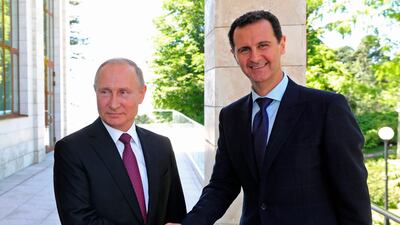The head of the global chemical weapons watchdog on Thursday defended the removal of Syria's voting rights, saying it showed an "ethical commitment" to eliminating toxic armaments.
Damascus and its ally Moscow slammed Wednesday's vote by a majority of countries at the Organisation for the Prohibition of Chemical Weapons to punish Syria.
Russia and Syria said the decision, made after an investigation found Syria had carried out three sarin and chlorine attacks in 2017, showed the regulator was becoming politicised by the West.
But OPCW chief Fernando Arias said this week's conference of member states "reaffirmed that the use of chemical weapons is the most serious breach of the convention there can be, as people's lives are taken or destroyed".
"By deciding to address the possession and use of chemical weapons by a state party, the conference has reiterated the international community's ethical commitment to uphold the norm against these weapons," Mr Arias said.
France introduced the motion on behalf of 46 countries, including Britain and the US, to punish Syria after it failed to answer questions about the weapons used in the 2017 attacks on the village of Lataminah.
Eighty-seven countries voted in favour of the motion, while 15 including Syria, Russia, China and Iran voted against and 34 abstained.
Syria's rights will remain suspended until member states decide that Damascus has fully declared all of its chemical weapons and factories.
Syria says the Lataminah attacks were fabricated and that it surrendered all of its chemical weapons after joining the OPCW in 2013, following a suspected sarin attack that killed 1,400 people in the Damascus suburb of Ghouta.


